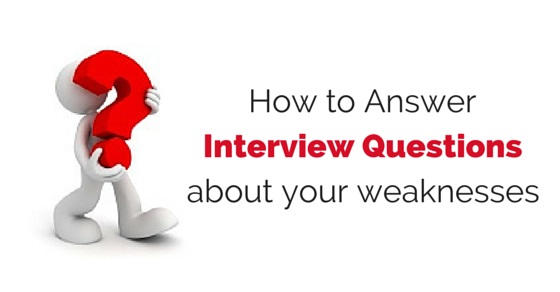Answering about your weaknesses during a job interview can be a challenging situation. Very few people know how to tackle such situations well. Others waver and get nervous when they are asked questions about their weaknesses. This makes them appear less confident. When the recruiters have to shortlist candidates, they get rid of such nervous candidates.
The moral of the story is that if you want a stable career and a promising job, you need to understand how to tackle such tricky questions. Here we have listed a few tips, guidelines and suggestions that will help you tackle questions about weaknesses.
What Is Your Greatest Weakness – Tips to Answer:
1. Camouflage Your Strengths As Weaknesses in Your Replies:
One of the best and most commonly used tricks in interviews is to camouflage your strengths as your weaknesses when asked about your weaknesses. This is a great way that works well. Here are some interesting answers that use a weakness to prove that you are an asset to the firm.
“ I can’t sleep peacefully if I have not completed all the tasks at hand. This is a great weakness and used to affect my health adversely. Now, I have learnt to manage all the work within the set deadline. Atleast I don’t have to spend sleepless nights anymore.”
“I feel restless if I take a decision all by myself regarding a certain project. I realised the best way to get rid of this restlessness is to discuss with the team, understand each one’s opinion and then pick the best and most reliable option. This keeps my team happy too.”
“ I hate it when people do not respect the time at hand. I expect my team to adhere to the time schedule. If the firm adheres to flexible timings, I make sure my team completes the stipulated time before they can leave.”
The above comments reveal you as an ideal candidate for the firm or organisation. This method used to work in interviews in the past. These days the interviewers have become smarter. They now add ‘a weakness that is not your strength’ in the question to trap you even more.
2. Present a Drawback in Positive Light:
So what do you do when you have no way to hide your weaknesses? Well, you need to be honest about your weakness. Yet, you have the option to be subtle so that the interviewer’s focus is not on your weakness but your attempts to deal with or combat it. Here are some replies that could help you deal with a question about your weakness neatly.
“My absence of mind is a great drawback. I often forget and misplace things and such a habit is disastrous when you hold a responsible position in office. That is the reason why I have downloaded some impressive apps that help me manage accounts and other nittygritties with ease.”
“I lose my temper easily and this has often affected my work in the previous organization. I have started Yoga and meditation to cool my mind. When I look at the human side of each employee, it helps me get a hold on my temper and work better.”
“I have realized that I am better at getting the work done than doing the work myself. That is the reason I pick management role and ensure that my team provides quality work.”
These are replies that do speak of your weaknesses but also reveal the steps you have taken to combat these weaknesses. Interviewers are usually pleased by such replies.
3. Compensate The Weakness By Highlighting Your Strengths:
If there is no way to escape the question on your weakness, a great option would be to confront the fact. You may accept to the interviewers that you possess certain weaknesses. But you must also speak to them about the multitude of strengths that would act as an asset to the firm or organization. Here are some of the replies that have clicked during interviews.
“There are many colleagues who think I am snobbish or proud. I may have poor interpersonal skills but what the firms fail to understand is that I rarely require the assistance of others to complete my work. Lack of interpersonal skills is just a result of my independence.”
“People think I am a bit slow in completing my task. The fact that many of my colleagues or ex-bosses don’t realize is that my work once complete does not require rechecking or amending. It is this perfection that consumes more time in the first go.”
These are answers that clearly focus your positive traits and show the reasons why a firm should think of hiring you. These are fabulous answers to questions about weaknesses and they are sure to impress your interviewers.
4. Why Interviewer Questions About Weaknesses?
If you understand the psychology behind questions about weaknesses, you may be in a better position to answer questions about weaknesses. You must remember that the interviewers or the recruiters are out there to evaluate you as a candidate. The questions they ask try to get you out of your comfort zone and make you reveal your true self.
Questions about weaknesses usually make people nervous. Even candidates who have come thoroughly prepared for the interview lose their composure. This is the best time to see how you react to tense or challenging situations. They get to know how you are when you are out of the comfort zone.
Things To Keep In Mind When You Are Asked About Your Weakness:
There is a general tendency that people tend to get nervous when they are questioned about their weaknesses. You must avoid this from happening to you when you confront such a question during the interview. Nervousness or anxiety is something that cannot be totally controlled by an individual. Yet, you can control and prevent revealing your true emotions to the interviewers.
Many candidates do not go prepared to deal with such questions. They do not think it significant to master the article of control over body language. Yet if you manage to control your body language, you will be able to get through tough rounds of interviews and bag the best jobs available. Here are some of the body language that you need to control:
1. Fumbling with Words:
Individuals who are already nervous or tense often give in when they are asked questions about their weaknesses. They tend to start fumbling due to tension. They start speaking a sentence and stop or stammer in the middle of the sentence. This can create a general impression that you are not confident or are scared.
The best trick to avoid this would be to request some time to think for the answer once the question is asked. You can take a couple of minutes to form your answer and then start speaking. This prevents you from fumbling and helps you answer confidently.
2. Avoiding Eye To Eye Contact:
Candidates often fail to realize the significance of eye contact while making a conversation. Eye contact conveys several facts about yourself. It tells the interviewer that you are a confident individual. It tells them you are mature and know how to communicate.
If you do not maintain eye contact or avert your eyes purposefully, it shows that you have some dark secrets. Only the guilty people or people with very low self-esteem avert eye contact during conversations. If you have a fear of interviews, you can try and practice mock interviews at home. This will add to your confidence and help you make proper eye contact during the interview.
3. Scratching Your Head:
Individuals tend to scratch their head when they are forgetful. Scratching the head can also mean unhygienic living conditions. In any case, scratching the head always creates a bad impression. If you have this habit, try and forcibly avoid it.
4. Bad Posture:
A posture is something that develops in the childhood. If a bad posture has become a habit, it becomes difficult to get rid of the posture once you grow old. The ideal posture is an erect posture. Drooping shoulders and leaning pose usually reflect laziness.
5. Ill Manners:
The interviewers also observe your manners and ways from the time you enter the interview room. It is thus a great idea to wish all the interviewers as soon as you enter the interview room.Speak politely to the people in the office. Your manners and ways count a lot when you are being shortlisted.
You must make it a point to reach the venue of the interview on time. If there are any delays, it is your duty to inform the interviewers about the delay.
If you follow these guidelines and control your reaction when you are being questioned about your weaknesses, you can get through inspite of your weaknesses. The interviewers are aware that every human being possesses certain weaknesses. If they realise your strengths are much more, your weaknesses won’t hamper your career.












































